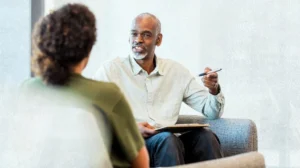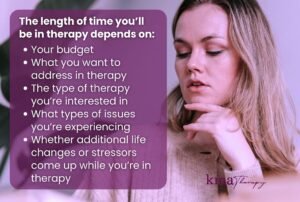Therapy is a special way to talk about your feelings and feel better. It helps you when you’re feeling sad, worried, or even confused. Many people use therapy to understand their thoughts and emotions and find new ways to feel happy again.
There are different types of therapy, each made for different problems. Some types help with feelings, while others focus on helping you face your fears or improve relationships. No matter the type, therapy is all about finding a way to heal your mind and live a better life.

1. What Is Therapy and Why Is It Important?
Therapy is a way to talk about your feelings with someone who understands. It’s a space where you can share what’s on your mind, and a trained therapist helps you feel better. Therapy can help when you’re feeling sad, anxious, or just stuck in life. It’s important because it gives people a safe place to work through their emotions.
Talking about your problems can be hard, but therapy makes it easier. It’s a way to understand yourself and find solutions to what’s bothering you. It’s like a tool that helps fix your thoughts and emotions so you can live a better, happier life.
For many people, therapy is important because it helps them manage stress and understand why they feel the way they do. Sometimes, just having someone to talk to makes all the difference. When life gets tough, therapy can be a helpful way to get through it.
2. Different Types of Therapy and How They Help
There are many kinds of therapy, and each one helps in a special way. Some therapies focus on changing the way you think, while others help you face fears or improve relationships. Cognitive-behavioral therapy (CBT) helps change negative thoughts, while exposure therapy helps you face things that make you anxious.
Some types help you talk about feelings, like emotion-focused Others, like family involve your loved ones to solve problems together. Each type of is made to help with different issues, so finding the right one is important.
can also be done in groups or one-on-one sessions. Group helps people share their experiences with others, while individual focuses just on you. Both can be useful, depending on what you’re going through.
3. How Therapy Can Make You Feel Better
Therapy is more than just talking—it’s a way to heal. When you go to you can learn new ways to handle stress, fear, and sadness. Over time, it can help you feel better by giving you tools to manage your emotions.
Through you might learn coping skills that you didn’t know before. These skills can make a big difference when you face tough times. Sometimes, just having someone listen and offer advice can help ease your worries and fears.
Feeling better takes time, but offers hope. It shows you that it’s okay to ask for help and that everyone can improve their mental health with the right support.
4. Why Do People Go to Therapy?
People go to therapy for many different reasons. Some may feel sad or anxious, while others want to improve their relationships. can also help when you’re going through big changes, like moving to a new city or dealing with a loss.
is also helpful for those who struggle with mental health issues like depression or anxiety. It can teach them ways to manage their feelings and stay in control of their lives. No matter the reason, is a way for people to get help and feel understood.
Sometimes, people just want to talk about their problems with someone who won’t judge them. gives them that chance. It’s a safe place where they can share their thoughts and start to feel better.
5. Can Therapy Help with Worries and Stress?
Many people feel worried or stressed, and therapy is one way to deal with these feelings. It helps you learn ways to calm your mind and reduce stress. teaches you how to understand your worries and change the way you think about them.
When stress builds up, it can make you feel overwhelmed. can show you how to manage stress and handle tough situations better. With the right tools, can make it easier to cope with everyday challenges.
Worries can feel like a heavy weight, but can help lift that weight. It’s not about getting rid of stress completely but learning how to manage it in a healthy way.
6. How to Choose the Right Therapy for You
Choosing the right therapy depends on what you’re going through. Some therapies are better for anxiety, while others work well for depression or relationship problems. It’s important to talk to a therapist who can guide you in the right direction.
If you’re not sure which type of is best, start by thinking about your needs. Do you want to focus on your thoughts or feelings? Are you looking for help with fears, stress, or something else? Talking to a professional can help you make the right choice.
is personal, so it’s okay to try different types until you find the one that works for you. Don’t be afraid to ask questions and take your time finding the right fit.

7. What Happens in a Therapy Session?
In a therapy session, you sit down with a therapist and talk about what’s on your mind. It’s a safe space to share your feelings and thoughts without being judged. The therapist listens and helps you understand your emotions better.
Each session may be different. Sometimes, you might talk a lot, and other times the therapist may ask questions to help you think about things in a new way. The goal is to help you feel better and find ways to solve your problems.
sessions are usually about an hour long. During this time, the therapist helps you work through any issues you have, offering guidance and support.
8. How Therapy Can Improve Relationships
Therapy is not just for personal issues—it can also help improve relationships. Couples is a popular way for partners to talk through their problems with a therapist’s help. It can make communication easier and help couples understand each other better.
Family works in a similar way, helping families solve problems together. If someone in the family is struggling, can bring everyone closer and create a healthier environment.
Even individual can improve relationships by teaching you how to express your feelings clearly. When you understand yourself better, it’s easier to connect with others in a positive way.
9. Is Therapy Only for Adults? How Kids Can Benefit Too
Therapy isn’t just for grown-ups—kids can benefit from it too. Play is one way therapists help children talk about their feelings. Through games and activities, kids can share what’s bothering them in a way that feels safe.
Sometimes, kids may struggle with things like school stress or family changes. can help them learn how to handle their feelings and build confidence. It’s a space where they can feel understood and supported.
Therapists who work with kids are trained to use special techniques that make fun and helpful. This way, children can grow emotionally and become happier and healthier.
10. Therapy for Anxiety: How It Works
Anxiety can feel overwhelming, but therapy is one way to take control. Therapists often use cognitive-behavioral (CBT) to help people with anxiety. This type of teaches you how to change negative thought patterns that cause worry.
In therapy, you’ll learn tools to manage your anxiety better. This can include relaxation techniques or practicing mindfulness. These skills help you stay calm in stressful situations and reduce your overall anxiety.
The goal of for anxiety is to help you feel more in control. By changing how you think and react, makes anxiety easier to handle over time.
11. The Benefits of Therapy for a Healthy Mind
Therapy offers many benefits for keeping your mind healthy. It’s a way to talk about your thoughts and feelings in a safe space. This can help reduce stress, anxiety, and other mental health issues over time.
One of the biggest benefits of is learning how to manage difficult emotions. By talking through your problems, helps you see things more clearly and find solutions. It’s like giving your mind a workout to keep it strong.
Therapy also improves your self-awareness. When you understand yourself better, it’s easier to make positive changes and live a happier life.
12. How Long Does Therapy Take to Show Results?
Therapy is not a quick fix, but it can bring results over time. Some people start to feel better after a few sessions, while others may need more time. It depends on what you’re working through and how open you are during therapy.
The important thing to remember is that everyone moves at their own pace. is a journey, and the time it takes to see results will be different for everyone. Patience is key to getting the most out of.
Therapy helps build long-lasting changes in how you think and feel. Over time, these changes can lead to a healthier, happier life.

Conclusion
Therapy is a powerful way to feel better and understand your emotions. It helps you talk about your problems and find ways to solve them. Whether you’re feeling sad, anxious, or just need someone to talk to, therapy offers a safe space to work through your feelings. It can make a big difference in your life by teaching you new ways to handle stress and challenges.
Remember, is not a quick fix, but it helps over time. Everyone’s journey is different, and that’s okay. If you ever feel stuck or need support, talking to a therapist can be a great step toward a happier, healthier you.










